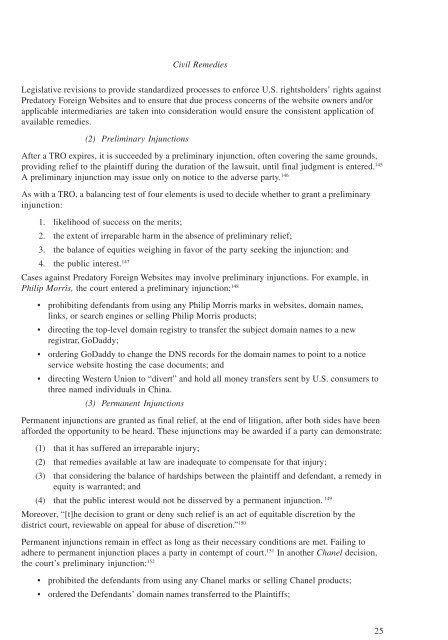1oz61wa
1oz61wa
1oz61wa
Create successful ePaper yourself
Turn your PDF publications into a flip-book with our unique Google optimized e-Paper software.
Civil Remedies<br />
Legislative revisions to provide standardized processes to enforce U.S. rightsholders’ rights against<br />
Predatory Foreign Websites and to ensure that due process concerns of the website owners and/or<br />
applicable intermediaries are taken into consideration would ensure the consistent application of<br />
available remedies.<br />
(2) Preliminary Injunctions<br />
After a TRO expires, it is succeeded by a preliminary injunction, often covering the same grounds,<br />
providing relief to the plaintiff during the duration of the lawsuit, until final judgment is entered. 145<br />
A preliminary injunction may issue only on notice to the adverse party. 146<br />
As with a TRO, a balancing test of four elements is used to decide whether to grant a preliminary<br />
injunction:<br />
1. likelihood of success on the merits;<br />
2. the extent of irreparable harm in the absence of preliminary relief;<br />
3. the balance of equities weighing in favor of the party seeking the injunction; and<br />
4. the public interest. 147<br />
Cases against Predatory Foreign Websites may involve preliminary injunctions. For example, in<br />
Philip Morris, the court entered a preliminary injunction: 148<br />
• prohibiting defendants from using any Philip Morris marks in websites, domain names,<br />
links, or search engines or selling Philip Morris products;<br />
• directing the top-level domain registry to transfer the subject domain names to a new<br />
registrar, GoDaddy;<br />
• ordering GoDaddy to change the DNS records for the domain names to point to a notice<br />
service website hosting the case documents; and<br />
• directing Western Union to “divert” and hold all money transfers sent by U.S. consumers to<br />
three named individuals in China.<br />
(3) Permanent Injunctions<br />
Permanent injunctions are granted as final relief, at the end of litigation, after both sides have been<br />
afforded the opportunity to be heard. These injunctions may be awarded if a party can demonstrate:<br />
(1) that it has suffered an irreparable injury;<br />
(2) that remedies available at law are inadequate to compensate for that injury;<br />
(3) that considering the balance of hardships between the plaintiff and defendant, a remedy in<br />
equity is warranted; and<br />
(4) that the public interest would not be disserved by a permanent injunction. 149<br />
Moreover, “[t]he decision to grant or deny such relief is an act of equitable discretion by the<br />
district court, reviewable on appeal for abuse of discretion.” 150<br />
Permanent injunctions remain in effect as long as their necessary conditions are met. Failing to<br />
adhere to permanent injunction places a party in contempt of court. 151 In another Chanel decision,<br />
the court’s preliminary injunction: 152<br />
• prohibited the defendants from using any Chanel marks or selling Chanel products;<br />
• ordered the Defendants’ domain names transferred to the Plaintiffs;<br />
25


